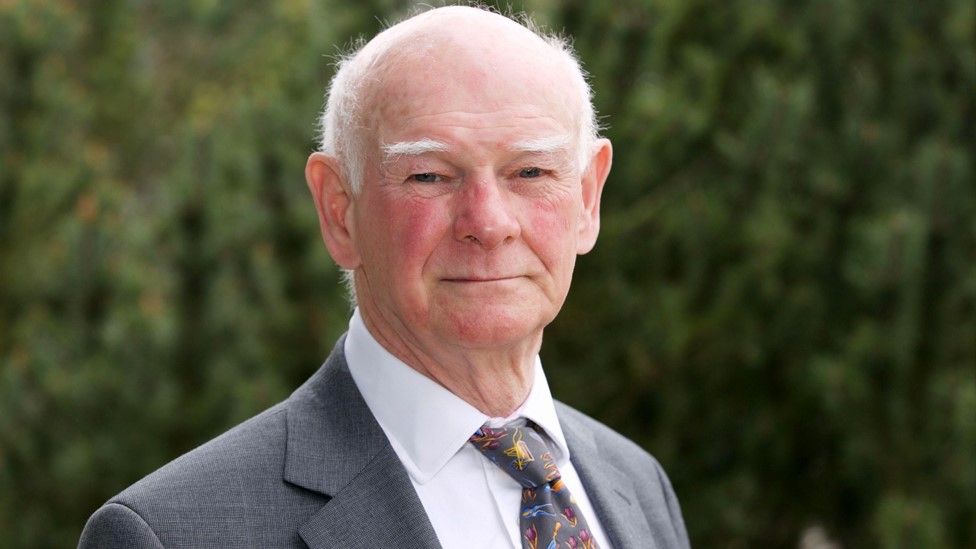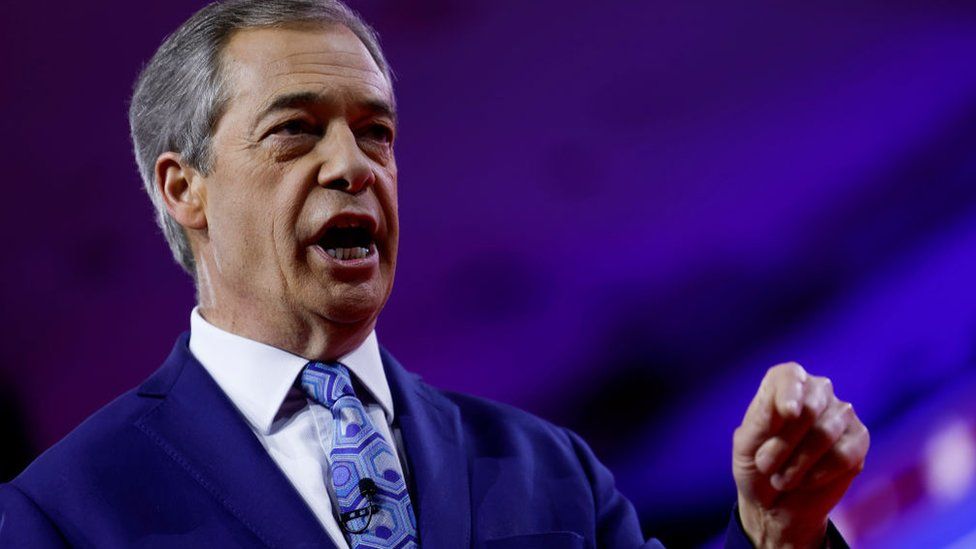NatWest chair Sir Howard Davies says he won’t quit over Farage row
-
Published

NatWest’s chair has said he will not quit after initially backing former boss Dame Alison Rose in the row over the closure of Nigel Farage’s account.
Sir Howard Davies said on Friday he would continue at the bank to ensure “stability” after the resignations of Dame Alison and the boss of Coutts.
NatWest is 39% owned by the taxpayer and Sir Howard said: “We do have the support of our main shareholder.”
However, on Thursday, the prime minister refused to back Sir Howard.
When asked if he would support the chair staying on until the middle of next year when Sir Howard is due to step down, Rishi Sunak said: “This isn’t about any one individual, it’s about values – do you believe in free speech and not to be discriminated against because of your legally held views?”
Sir Howard’s pledge to stay on came as the bank announced a sharper-than-expected rise in first-half profits – the last set of results under the leadership of Dame Alison. Pre-tax profits in the six months to 30 June soared to £3.6bn, from £2.6bn a year earlier.
‘Political reaction’
Dame Alison left the bank earlier this week “by mutual consent” with the board after admitting she had made a mistake in speaking about Mr Farage’s relationship with Coutts, a subsidiary of NatWest which is focused on wealthy clients.
Earlier this month, former UKIP leader Mr Farage said that his account at Coutts had been closed and that he had not been given a reason.
The BBC reported that it was closed because he no longer met the wealth threshold for Coutts, citing a source familiar with the matter.
However, Mr Farage later obtained a report from the bank that indicated his political views were also considered.
Hours before Dame Alison resigned over the closure of Mr Farage’s Coutts account, Sir Howard said the board retained “full confidence” in her.
However, the BBC was told that Downing Street and Chancellor Jeremy Hunt had “significant concerns” over Dame Alison’s conduct.
On Friday, Sir Howard said: “The reaction, the political reaction… was such that Alison and I then concluded, and the board supported the view, that her position was then untenable.”
He added: “She would be running the bank in the face of very difficult headwinds and therefore we made a different decision.”
The day after Dame Alison’s resignation, Peter Flavel, the chief executive of Coutts, a subsidiary of NatWest where Mr Farage held his account, also quit.
Mr Farage has called on Sir Howard to also step down.
While announcing NatWest’s half-year results, Sir Howard said the bank had appointed City law firm Travers Smith to conduct an independent investigation into the closure of Mr Farage’s account and how the information surrounding the issue had been handled.
Victoria Scholar, head of investment at Interactive Investor, told the BBC’s Today programme: “It is a real shame that Alison Rose had to go.
“We know that she was a role model to many and a champion of diversity and inclusion but clearly her discussions [about] Nigel Farage have breached client confidentiality, which is absolutely sacrosanct in the industry and means her role is no longer tenable.”
NatWest declined to comment on what, if any, severance package Dame Alison would receive. Sir Howard said that any decisions on her pay would be made after the independent investigation had concluded and set out in the bank’s annual report.
Last year, Dame Alison, who worked at NatWest for more than 30 years, was paid £5.25m.
In his first outing as Dame Alison’s interim replacement, NatWest chief executive Paul Thwaite said: “It is an understatement to say that these are not ideal circumstances for anyone to take over.
“It is clear to me that we got some things wrong. It will take time to address some of those challenges. But I’ve already taken action and I’m determined we learn and start to move forward quickly.”
‘Many struggling’
In its results, NatWest’s chief financial officer, Katie Murray, said that while arrears during the first six months of its financial year “remain low, we know that people, families and businesses are anxious about their finances and many are really struggling”.
“We are being proactive in our support for those who are hardest hit,” she said.
Mortgage arrears of between one and three months rose to £171m from £133m in the same period last year.
Arrears of more than three months rose only slightly, to £238m from £233m last year.
Related Topics
-
Coutts Bank boss quits over Farage account row
-
Published18 hours ago
-

-
NatWest boss quits after Farage bank account row
-
Published1 day ago
-
